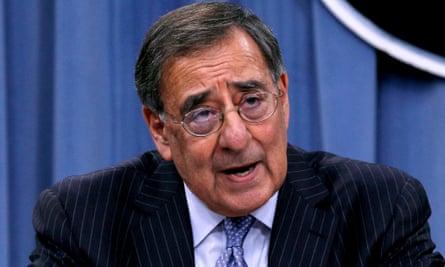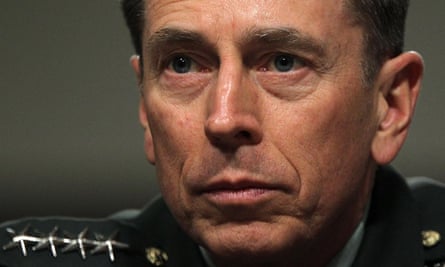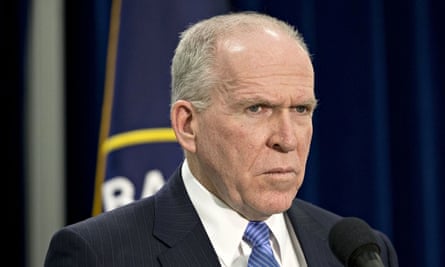Since Barack Obama entered the White House in 2009, his government has waged a war against whistleblowers and official leakers. On his watch, there have been eight prosecutions under the 1917 Espionage Act – more than double those under all previous presidents combined.
And yet other apparent leaks have gone entirely unpunished or have been treated, as in the case of General David Petraeus, as misdemeanors. As Abbe Lowell, lawyer for one of the Espionage Act eight, Stephen Kim, has argued in a letter to the Department of Justice, low-level officials who lack the political connections to fight back have had the book thrown at them, while high-level figures have been allowed to leak with “virtual impunity”.
One law for us …
Leon Panetta: enjoying his retirement on a walnut firm
Michael Vickers: remains in post

Panetta, the former CIA director and defense secretary who has been a fixture in the Democratic firmament for decades, today spends his retirement on his walnut farm on California’s Monterey peninsula. Had his name been more obscure, or his position lower, he might have found himself in a less hospitable locale after permitting the makers of the film Zero Dark Thirty access to details about the secret raid that killed Osama bin Laden in 2011.
Film-maker Mark Boal was permitted to attend a secret speech Panetta gave at CIA headquarters on 24 June 2011, less than two months after the raid. Military special operators were “all in uniform with name tapes” and seated at the front, according to a 2013 draft Pentagon inspector general report. Panetta’s speech – the text of which read “SECRET//NO FORN” – ie, not for release to foreigners – revealed “the unit that conducted the operation and identified the ground commander by name”.
Boal’s attendance, according to the inspector general report, occurred in an atmosphere defined by Obama administration eagerness to cooperate with Zero Dark Thirty. A key figure facilitating that cooperation was Michael Vickers, as undersecretary of defense for intelligence the Pentagon’s senior civilian intelligence official. Vickers is something of a CIA legend: a wunderkind who in the 1980s aided the anti-Soviet jihad in Afghanistan, he was played by Christopher Denham in the 2007 Tom Hanks vehicle Charlie Wilson’s War.
In 2011, Vickers met and talked repeatedly with Boal and the film’s director, Kathryn Bigelow. In one of those conversations, on 15 July, Vickers specifically named a “special operations planner” who, he told the film-makers, “can probably give you everything you would want”. According to the inspector general report, Admiral Eric Olson, then the commander of US Special Operations Command, had already told Vickers: “My (our) hope and intent is that [the Special Operations Planner] not be identified by name as having participated in any way.”
Neither man has been prosecuted. Vickers remains the undersecretary of defense for intelligence. Zero Dark Thirty has been criticized for inaccurately portraying CIA torture as critical to the success of the Bin Laden raid.
The ‘Olympic Games’ leaker(s): no charges
In June 2012, with a presidential election under way, David Sanger of the New York Times published an explosive story: Obama had ordered “a wave of cyber-attacks against Iran”. The sabotage operations were ongoing and included Stuxnet, the US-Israeli developed worm that assaulted the systems controlling Iranian centrifuges.
Olympic Games – the code name for the operation – was a milestone in two ways. It brought the US into the unfamiliar territory of a first-use cyber-attack that compromised physical systems, precisely the sort of network assault that its own officials publicly cite as a grave and impending danger. It was also described to Sanger by “members of the president’s national security team who were in the room” at a time when Obama was under attack by Republican rival Mitt Romney as weak on national security generally and Iran specifically.
The disclosure was so shocking that within days of Sanger’s story being published the Democrat Dianne Feinstein, then chair of the Senate intelligence committee, called for an inquiry. That inquiry, by the FBI, has been said to focus on James “Hoss” Cartwright, a now-retired marine general who had served as vice-chairman of the joint chiefs of staff and a rare flag officer trusted by the White House.
Cartwright has not been charged, and the Olympic Games inquiry is said to have run aground – because Cartwright’s attorney might “try to put the White House’s relationship with reporters and the use of authorized leaks on display” on trial, the Washington Post recently reported.
David Petraeus: jail time unlikely for ‘misdemeanor’

Petraeus, the most celebrated army general of his generation who went on to become director of the CIA, is now out of legal trouble. Earlier this month, Petraeus pleaded guilty to a misdemeanor violation of classified information, ending a years-long official inquiry.
His plea deal involved his assent to a factual stipulation: in August 2011, Petraeus provided his biographer and mistress, Paula Broadwell, with notebooks containing “the identities of covert officers, war strategy, intelligence capabilities and mechanisms, diplomatic discussions, quotes and deliberate discussions from high-level National Security Council meetings and … the President”. He lied to FBI investigators in October 2012, stating that he never gave Broadwell any classified information.
Unlike other leakers, authorized or not, Petraeus has been warmly re-embraced by the highest levels of Washington policymakers.
“I believe it is time to consider this matter closed,” said Senator John McCain. His Democratic counterpart on the Senate armed services committee, Jack Reed of Rhode Island, added: “At this difficult moment for the Petraeus family, it is important to remember the extraordinary sacrifice and service he has rendered to our armed forces and the nation.”
Petraeus faces a $40,000 fine but is is unlikely to serve jail time. He remains an adviser to the Obama administration on its war against the Islamic State. His position with the private equity firm KKR appears unaffected.
John Brennan: promotion to lead the CIA

Since joining Barack Obama’s first presidential campaign, the CIA director and former White House counter-terrorism and homeland security coordinator, John Brennan, has been Obama’s liaison to the secret world of US intelligence. It has rewarded Brennan tremendously: not only does he now run the agency he served for decades, his position appears secure even after he obstructed a Senate inquiry into Bush-era torture. Perhaps his most ironic aspect of that obstruction was an attempt to get the Justice Department to investigate Senate staffers for allegedly removing classified information.
Yet while Brennan was still a White House official, on 7 May 2012, he talked about having “inside control” of a plot by al-Qaida in the Arabian Peninsula (AQAP) to place a bomb on a US-bound plane. Brennan’s confirmation occurred on an official conference call with ex-counter-terrorism officials who now recycle intelligence-community talking points for TV news outlets.
“We were confident that we had inside control over the – any plot that might have been associated with this device,” Brennan is quoted in a transcript later obtained by Judicial Watch, in which he attempts to assure the media personalities that the danger from the bomb was marginal. Subsequent media reports promptly stated that the US and its allies had infiltrated the terror group.
Months later, when Brennan testified before the Senate intelligence panel for his CIA confirmation hearing, the long-time intelligence official denied he had in fact confirmed the AQAP infiltration. Yet he confirmed that he had said the US had “inside control” of the plot and lamented that the operation “got out to the press before that operation was, in fact, concluded”.
In March 2013, the Senate confirmed Brennan as CIA director by a 63-34 vote.
Another law for them…
Stephen Kim: 13 months in prison
The former State Department contractor has served eight months of a 13-month sentence for violating the Espionage Act. He was subjected to a five-year legal ordeal, at the end of which he pleaded guilty to leaking details of North Korea’s nuclear program to a Fox News reporter, though he insisted he had done so to inform the American people about the nature of the North Korean threat.
Before he was incarcerated at the Federal Bureau of Prisons in Cumberland, Maryland, Kim told The Intercept that the intensity of his prosecution had driven him to the verge of suicide. His lawyer has now written to the Department of Justice, calling for him to be released immediately in recognition of the “profound double standard” displayed by the contrasting treatment of General David Petraeus.
Chelsea Manning: 35 years in military custody

The army intelligence analyst is serving a 35-year sentence for transferring to WikiLeaks a treasure trove of confidential US files to which she had access at a military base in Iraq. Manning was found guilty of violations of the Espionage Act, and computer crimes.
No evidence has ever been presented that her actions caused harm to anybody, while others have argued the disclosures helped to inspire the democratic uprisings of the Arab Spring.
Manning, who is currently appealing, said at the time of her sentencing: “When I chose to disclose classified information, I did so out of a love for my country and a sense of duty to others.”
Jeffrey Sterling: facing years in prison
The former CIA officer is awaiting sentencing next month, having been convicted in January under the Espionage Act. He pleaded not guilty to leaking information about a covert effort to disrupt Iran’s nuclear program to a New York Times reporter, James Risen, details of which appeared in Risen’s book State of War.
Sterling faces a sentence that could run to decades in prison. Not only was his treatment notably severe, but the Department of Justice also aggressively pursued Risen, essentially threatening the journalist with imprisonment for refusing to disclose his source.
John Kiriakou: served two years in federal prison

The former CIA analyst is currently under an 86-day house arrest, having been released from a 30-month sentence at a correctional facility in Loretto, Pennsylvania. The information he leaked to a reporter – the identity of a covert agent involved in the CIA’s harsh interrogation techniques under President George W Bush – was never published.
Kiriakou’s supporters point out that he is the only person to be prosecuted for any aspect of the CIA’s use of torture, including waterboarding, which he first confirmed publicly in 2007. Leaking details of the abuses has earned him jail time, while the torture itself has gone unpunished.

Comments (…)
Sign in or create your Guardian account to join the discussion